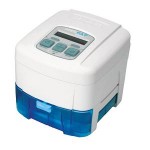 Snoring during sleep is one of the most common symptoms of sleep apnea. However, some snorers do not have this serious sleep disorder.
Snoring during sleep is one of the most common symptoms of sleep apnea. However, some snorers do not have this serious sleep disorder.
If you (or your partner or child) snore during the night, it’s important to examine this symptom and to see whether or not it is indicative of a larger problem, i.e. obstructive, central or mixed sleep apnea.
To help you discover whether or not your snoring is a signal of an underlying sleep disorder, we’ve compiled some frequently asked questions about snoring and its connection to the different forms of sleep apnea.
Sleep Apnea is Dangerous
 Before we begin, you should know that sleep apnea has the potential to damage your health by straining your heart, pumping up your blood pressure to unhealthy levels, and creating a state of chronic exhaustion that has the capacity to take a heavy toll on your relationships and your career.
Before we begin, you should know that sleep apnea has the potential to damage your health by straining your heart, pumping up your blood pressure to unhealthy levels, and creating a state of chronic exhaustion that has the capacity to take a heavy toll on your relationships and your career.
That’s why diagnosing sleep apnea is so important, and your snoring may be a clue that you have this disease. Sleep apnea develops for a variety of reasons; often weight gain is a trigger.
The larger your neck size, the greater your chances of getting sleep apnea, as internal tissues inside of the throat area lose their tension and elasticity when extra pounds widen your neck circumference.
However, some perfectly fit people still suffer from sleep apnea nightly.
Here are some frequently asked questions and answers about snoring and sleep apnea…
Snoring and Sleep Apnea FAQs
I snore. Do I have sleep apnea?
You might. One clue that your snoring is less than innocuous is the way it sounds and how often it happens. For example, if you snore very loudly, and your snoring is intermittent, rather than a constant rhythm, you may have sleep apnea.
Typically, sleep apnea sufferers have stop-start breathing patterns all through the night – in fact, they stop breathing for seconds at a time, which is seriously unhealthy.
Snoring that happens “between” apnea episodes is a sure-fire clue that sleep apnea is affecting your body and brain. If this snoring pattern sounds like yours (or that of someone you care about), you should see your family doctor right away.
What is Primary Snoring?
Primary snoring is the “harmless” kind of snoring, and it’s not usually linked with obstructive, central, or mixed sleep apnea.
When reading about sleep apnea and snoring, you may see comparisons between primary snoring and snoring that indicates sleep apnea.
You should know that primary snoring is not intermittent; it goes on all night without any breaks and stops and starts.
While primary snoring may annoy your bed partner, it’s not usually a serious health condition, or an indicator of underlying disease.
I think I have sleep apnea. My snoring stops and starts, and it’s quite loud. What should I do?
 To cure your sleep apnea, you must get a formal diagnosis of sleep apnea from your physician, and then purchase one of a selection of easy-to-use, affordable CPAP machines and CPAP nasal masks.
To cure your sleep apnea, you must get a formal diagnosis of sleep apnea from your physician, and then purchase one of a selection of easy-to-use, affordable CPAP machines and CPAP nasal masks.
These products should be obtained from a reputable dealer. These accessories work wonders, and they will usually be covered by your health insurance. This new CPAP therapy will regulate your breathing while you sleep, allowing you to wake up fresh and rested.
Take control of your health today…contact a trained, caring sleep apnea treatment specialist.

1 thought on “Snoring and Sleep Apnea FAQs”
Wow! I just learned something today! Cool! Like!